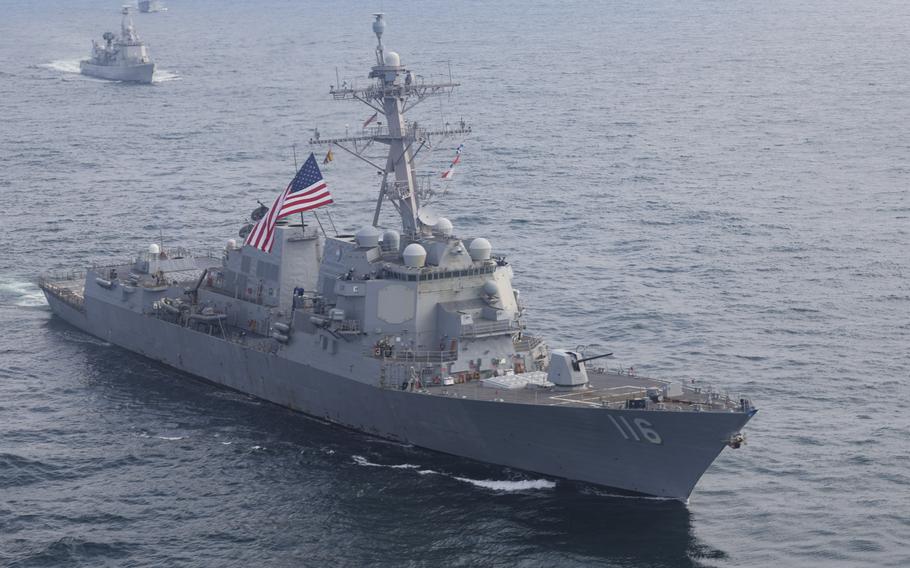
The destroyer USS Thomas Hudner maneuvers in the Atlantic Ocean during the Formidable Shield exercise on May 12, 2025. (Jonathan Nye/U.S. Navy)
MANAMA, Bahrain — Families of U.S. military personnel continued to depart bases in the Middle East on Friday, following a barrage of Israeli strikes against Iranian military leaders and nuclear sites that many in the region fear could be the beginning of a broader conflict.
Commercial flights across the Middle East were diverted or canceled after Iraq and Jordan shut down their airspaces on Friday. Some of the military dependents who chose to leave Bahrain were flown to bases in Italy before getting on commercial flights to the United States.
Personnel at Naval Support Activity Naples were told to stay on alert over the weekend to handle more incoming families.
In Bahrain, officials on Friday restricted nonessential activities on base. The U.S. Embassy in Bahrain issued a security alert urging American citizens and embassy personnel to avoid nonessential travel.
For one military family, concern that the voluntary program to leave Bahrain might become a mandatory evacuation stirred fears of sudden separation and upheaval.
“I was devastated when I heard the news,” Samana Qambar, a Bahraini and wife of a U.S. Navy sailor, said after hearing about the family flights.
Qambar had been apart from her husband for more than two years due to deployments, and they just arrived at their Bahrain assignment two months ago.
“To think that after all this time that we spent apart, and now we’re finally together and in Bahrain, ready to build our life, that we would have to put that all on hold again was too much,” Qambar said.
Military officials had not issued any statements as of Friday that families might be required to leave Bahrain. However, at bases in some countries, such as Turkey, the military has ended accompanied tours due to security concerns in the past.
U.S. officials have emphasized that the current conflict is between Israel and Iran, and that measures to evacuate diplomats and families are being taken as a precaution.
Citing two U.S. officials, the Associated Press on Friday reported that the U.S. Navy had directed the destroyer USS Thomas Hudner to begin sailing toward the eastern Mediterranean and directed a second destroyer to begin moving so it can be available if needed.
Ken Pollack, vice president for policy at the Middle East Institute, a Washington-based think tank, said Iran likely wants to avoid inciting retaliation from the U.S., which has the capacity to do great damage.
Iran has “a healthy respect for the military capabilities of the United States of America … and a desire to avoid providing the United States with a pretext to use that military power, to provoke us into using that military power against them,” Pollack said on a call with reporters Friday.
Iran has long taken the position that any Israeli attacks are tacitly sanctioned by the U.S., said Brian Carter, the Middle East portfolio manager at the American Enterprise Institute’s Critical Threats Project.
Carter added that the U.S. may be moving destroyers to the region to defend Israel against ballistic missiles, as it did last year.
Another factor U.S. officials are weighing is the proximity of military bases to Iran.
A ballistic missile traveling to Israel from Iran would take more than 10 minutes to arrive, Carter said, but such an attack could reach U.S. forces in the region much faster.
“Any decision [by the U.S.] to take military action against Iran really needs to take into account the risks to U.S. forces and have contingencies in place to deal with those risks,” Carter said.
Retired Gen. Frank McKenzie, a former CENTCOM commander, said despite recent strikes, Iran has a significant arsenal of ballistic missiles.
The U.S. has the ability to defend itself, McKenzie added, but the Iranians would be able to put “a lot of missiles against those targets.”
President Donald Trump for months has warned Israel against striking Iran as the U.S. pursues a diplomatic resolution to discussions over its nuclear facilities.
Shortly after Israel launched missiles, Secretary of State Marco Rubio issued a short statement seeking to distance the U.S. from the hostilities.
“We are not involved in strikes against Iran and our top priority is protecting American forces in the region,” the statement said. “Let me be clear: Iran should not target U.S. interests or personnel.”
Trump then took to his social media site to warn that things will “only get worse” if Iran does not make a deal, adding that U.S. military equipment is lethal, and “Israel has a lot of it, with much more to come.”
“JUST DO IT, BEFORE IT IS TOO LATE,” Trump wrote on Truth Social.
Stars and Stripes reporter Alison Bath contributed to this report.